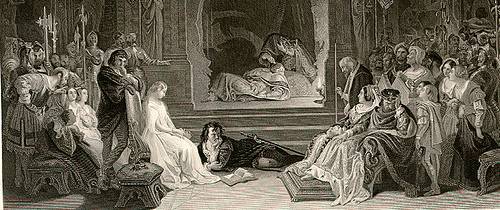
Hamlet’s “to be or not to be” soliloquy, in Klingon:
taH pagh taHbe’. DaH mu’tlheghvam vIqelnIS.
quv’a’, yabDaq San vaQ cha, pu’ je SIQDI’?
pagh, Seng bIQ’a’Hey SuvmeH nuHmey SuqDI’,
‘ej, Suvmo’, rInmoHDI’? Hegh. Qong — Qong neH —
‘ej QongDI’, tIq ‘oy’, wa’SanID Daw”e’ je
cho’nISbogh porghDaj rInmoHlaH net Har.
yIn mevbogh mIwvam’e’ wIruchqangbej.
Hegh. Qong. QongDI’ chaq naj. toH, waQlaw’ ghu’vam!
HeghDaq maQongtaHvIS, tugh nuq wInajlaH,
volchaHmajvo’ jubbe’wI’ bep wIwoDDI’;
‘e’ wIqelDI’, maHeDnIS. Qugh DISIQnIS,
SIQmoHmo’ qechvam. Qugh yIn nI’moH ‘oH.
It either endures, or it does not endure. Now, I must consider this sentence.
Is it honorable, when one endures the torpedoes and phasers of agressive fate?
Or, when one obtains weapons to fight a seeming ocean of troubles,
And when, by fighting, one finishes them? One dies. One sleeps. One merely sleeps.
And when one sleeps, it is believed that one can finish the pain of the heart
And the thousand revolts which one’s body must succeed to.
We are certainly willing to initiate this way to finish life.
One dies. One sleeps. When one sleeps, perhaps one dreams. Well, this situation seems to be the obstacle!
What we can soon dream of, while sleeping in death,
Having thrown away from our shoulders the cargo of the mortal —
When we consider that, we must retreat. We must endure disasters,
Because this idea makes us endure them. It lengthens the life of the disasters.
